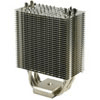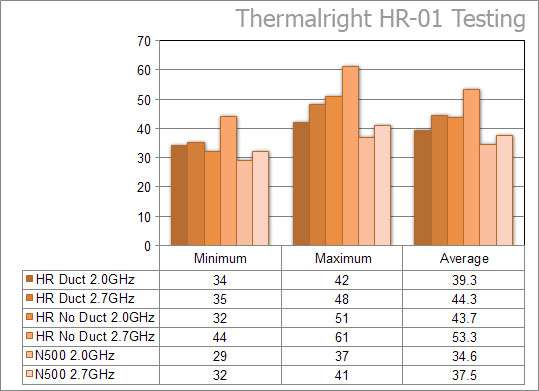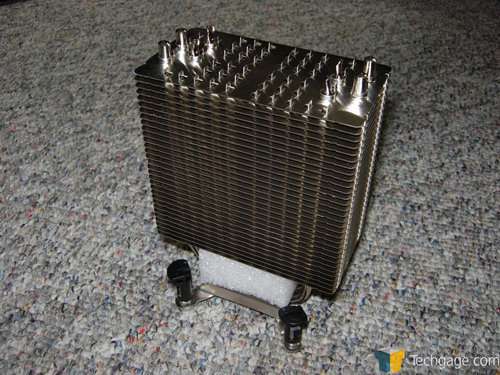- Qualcomm Launches Snapdragon 4 Gen 2 Mobile Platform
- AMD Launches Ryzen PRO 7000 Series Mobile & Desktop Platform
- Intel Launches Sleek Single-Slot Arc Pro A60 Workstation Graphics Card
- NVIDIA Announces Latest Ada Lovelace Additions: GeForce RTX 4060 Ti & RTX 4060
- Maxon Redshift With AMD Radeon GPU Rendering Support Now Available
Thermalright HR-01-K8 CPU Cooler

In the prospect of building a quiet PC, cooling the CPU can prove to be a problem. To take care of this ‘tall’ order, Thermalright brings us the HR-01. This passive cooler requires no fan at all to operate. If overclocking suits your fancy, they even offer a duct!
Page 3 – Testing, Conclusion
|
|
To test out the cooler, I ran an instance of SuperPi and Prime95 (Small FFT) at the same time, for 30 minutes. I ran the tests with and without the duct, at both 2.0GHz and 2.7GHz. Prior to installing the HR-01-K8, I ran the same tests using the Corsair Nautilus 500 water cooling system. There’s no doubt that this water cooling will be significantly better than the HR, but the goal is to simply show differences. The room temperature during all of the testing hovered between 80°F – 81°F. In between each test, the computer was turned off until the heatsink was cool, so as to start fresh each time.
- Test System
- CPU: AMD Venice 3200+ @ 2.70GHz
- Motherboard: DFI Ultra-D w/ 406BTA BIOS
- Memory: Corsair 2GB 3500LL PRO @ 270MHz 3-3-2-0
- Video: eVGA 7800GT
- Sound: Chaintech AV-710
- Storage: Seagate 750GB 7200.10
- Odds and Ends: D-Link WiFi PCI Card
- Etcetera: Windows XP Professional SP2, Windows x64 Professional SP1, NVIDIA 81.98 Drivers
- Cooling: Corsair Nautilus 500

I am actually quite surprised at the difference that the duct made. Adding it took 9°C off of the 2.0GHz max temp, and 13°C off the 2.7GHz max temp. That is not a small difference! Needless to say, it’s obvious why you will want to use the duct.
The N500 really does clean up in all of the tests, but that’s no surprise. For a passive cooler though, I am -very- impressed with how it held up. Especially because my ambient room temp is so high. It handled the CPU’s 35% overclock without going over 50°C, which I respect.
Obviously this cooler is not for everyone. It caters to the quiet PC crowd, and does it deliver! The only sound coming out of my PC was the 120mm fan in the back and the GPU fan.. so overall it was a very quiet PC. Using the duct proved to help a -lot-, so there is no reason to consider not buying one, unless you are using the cooler in a very small case or don’t plan to have even a minor overclock.
Though I enjoyed the passive performance of the cooler, there are a few things I really didn’t care for. The primary issue being the installation. Looking past the lack of instructions, I found I really had to force the cooler in to place, which never sits right with me. I almost cut myself, and thought I was going to damage the board.
The cooler is also so tall, that my case door will not fit back on. If the cooler was half an inch shorter, it would be fine. It really depends on your case, but the NZXT Lexa is not an extra small case by any means. The same goes for the duct also though. With it installed, I have to force the door back on. If your case does not have a fan in the door, you should be 100% ok. Just bare in mind, that a door fan will likely get in your way, if it aligned up with the CPU socket remotely close.
Regardless, if you are a ‘fan’ of passive cooling, and have a case that will house this beast, you will do good to pick one up. I am awarding the HR-01 an 8 out of 10.
- Pros
- Top rate build quality
- Completely silent cooling!
- Duct adds a lot to the cooling
- Did well in tests even with overclocked CPU
- Cons
- Installation was tricky
- Duct could also be tricky depending on your case
- Could not put door back on PC with cooler installed
If you have a comment you wish to make on this review, feel free to head on into our forums! There is no need to register in order to reply to such threads.

|
|
Support our efforts! With ad revenue at an all-time low for written websites, we're relying more than ever on reader support to help us continue putting so much effort into this type of content. You can support us by becoming a Patron, or by using our Amazon shopping affiliate links listed through our articles. Thanks for your support!






